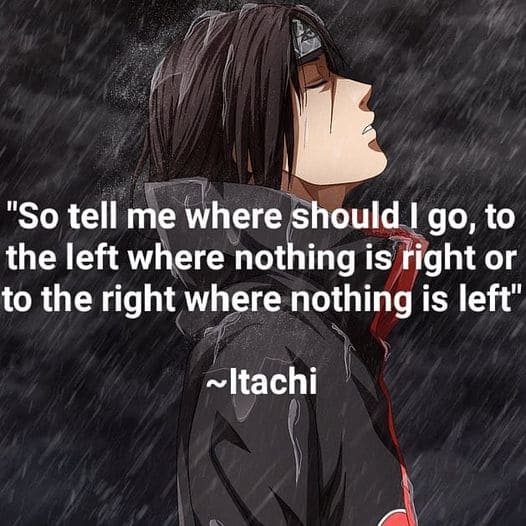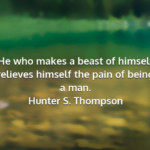Itachi Uchiha, a character from the popular manga and anime series “Naruto,” once said, “Tell me… where should I go? To the left, where nothing is right? Or to the right, where nothing is left?” This quote has become quite famous and has been used in various contexts to express the dilemma of making a difficult decision. In this blog post, we will explore the meaning behind this quote and how it can be applied to our daily lives.
The Origin of the Quote
The quote was spoken by Itachi Uchiha during a conversation with his younger brother Sasuke. Itachi, who was a member of the Uchiha clan, had killed all of his clan members except for Sasuke, who he left alive to seek revenge. Itachi was aware of the dark path he had chosen, and he knew that Sasuke was also struggling to find his own path. It was in this context that Itachi posed the question, “Tell me… where should I go? To the left, where nothing is right? Or to the right, where nothing is left?”

The Meaning Behind the Quote
At first glance, the quote might seem confusing or even meaningless. However, upon closer inspection, it reveals a profound truth about the nature of choices and decisions. Itachi’s dilemma reflects the fact that sometimes we have to choose between two options, neither of which is ideal. Both options may have their own set of drawbacks, and we may have to make a choice that involves sacrifice or compromise.
The quote also highlights the importance of perspective in decision-making. Itachi’s choice of words suggests that the left and the right are not inherently good or bad. Instead, their value depends on the perspective of the person making the choice. What might be right for one person might not be right for another. It is up to us to decide what is most important to us and make a decision accordingly.
Moreover, the quote reminds us that sometimes, the choice we make is not as important as the actions we take afterward. Itachi knew that his actions had consequences, and he was willing to accept them. Similarly, we must be willing to take responsibility for our choices and actions and be ready to face the consequences.
Expanding on the Topic
The Importance of Self-Reflection
One of the key takeaways from Itachi’s quote is the importance of self-reflection. Making a difficult decision requires us to understand our values, goals, and priorities. We need to reflect on what matters most to us and how we want to live our lives. Self-reflection helps us gain clarity and make choices that align with our values.
The Role of Fear
Making difficult decisions often involves overcoming fear. Fear of failure, fear of the unknown, and fear of the consequences can all hold us back from making a choice. However, as Itachi’s quote suggests, sometimes we have to face our fears and make a decision anyway. Courage and resilience are essential qualities for making difficult choices.
The Limits of Rational Thinking
While rational thinking and logical analysis are essential tools for decision-making, they have their limits. Itachi’s quote reminds us that sometimes, there is no clear-cut answer or logical solution. Our intuition, emotions, and personal experiences also play a role in decision-making. We need to learn to trust our instincts and use our emotions as a guide, alongside rational thinking.
Conclusion
Itachi’s quote, “Tell me… where should I go? To the left, where nothing is right? Or to the right, where nothing is left?” may seem enigmatic at first, but it carries a powerful message about the nature of difficult choices. Making a choice that involves sacrifice or compromise is never easy, but it is often necessary for personal growth and development. It is up to us to reflect on our values and priorities and make a decision that aligns with our goals.
Moreover, the quote reminds us that sometimes, the choice we make is not as important as the actions we take afterward. We must be willing to take responsibility for our choices and actions and be ready to face the consequences. Making a difficult decision is just the first step; we must also follow through and take action to achieve our goals.
In conclusion, Itachi’s quote is a powerful reminder that sometimes, there is no easy answer or clear-cut solution. Making a difficult decision requires us to reflect on our values, face our fears, and trust our instincts. By doing so, we can make choices that align with our goals and ultimately lead to personal growth and fulfillment.










